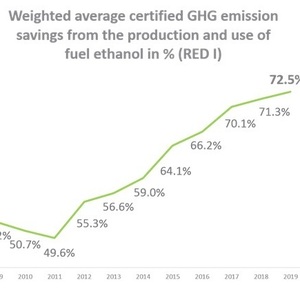ePURE: GHG reduction performance of EU ethanol reaches new high

June 25, 2020
BY ePURE
Production and use of renewable ethanol from ePURE members delivered an average of more than 72 percent greenhouse gas (GHG) savings compared to fossil fuels in 2019, according new certified data.
This record-high average performance continues an eight-year trend of annual improvements to the climate-change-fighting potential of EU ethanol.
Advertisement
Advertisement
“Every year, renewable ethanol increases its greenhouse-gas reduction score and confirms its importance to the EU’s long-term energy and climate strategies,” said Emmanuel Desplechin, secretary-general of ePURE, the European renewable ethanol association. “This year, the COVID-19 crisis has underlined the need for a strong EU ethanol industry producing not just low-carbon fuel but also ethanol for disinfectant use and animal feed to ensure domestic supply. Going forward, with the increased renewable-energy ambitions of the EU Green Deal, renewable ethanol’s role in the transport energy mix is more vital than ever.”
Renewable ethanol produced by ePURE members is refined from European feedstock and works at scale in petrol engines, which still power the majority of new cars being bought in the EU and will be predominant on the roads for the next decades. Promoting ethanol use in the EU—by adopting E10 (as 13 Member States have already done) or higher ethanol blends; by increasing ambitions for renewables in transport; by taxing energy based on carbon intensity instead of volume—would help Europe achieve its Green Deal transport decarbonization goals.
The increased GHG-saving performance of ePURE members’ ethanol was also accompanied by significant production of animal feed (3.8 million dry matter equivalent metric tons) and of captured CO2 (0.8 million metric tons). The 2019 findings were compiled from ePURE members and certified by auditing firm Copartner.
Advertisement
Advertisement
ePURE’s membership includes 19 producing companies with around 50 refineries in 16 EU Member States, accounting for about 85 percent of EU renewable ethanol production.
Related Stories
The U.S. EPA on July 8 hosted virtual public hearing to gather input on the agency’s recently released proposed rule to set 2026 and 2027 RFS RVOs. Members of the biofuel industry were among those to offer testimony during the event.
The U.S. exported 31,160.5 metric tons of biodiesel and biodiesel blends of B30 and greater in May, according to data released by the USDA Foreign Agricultural Service on July 3. Biodiesel imports were 2,226.2 metric tons for the month.
The USDA’s Risk Management Agency is implementing multiple changes to the Camelina pilot insurance program for the 2026 and succeeding crop years. The changes will expand coverage options and provide greater flexibility for producers.
EcoCeres Inc. has signed a multi-year agreement to supply British Airways with sustainable aviation fuel (SAF). The fuel will be produced from 100% waste-based biomass feedstock, such as used cooking oil (UCO).
President Trump on July 4 signed the “One Big Beautiful Bill Act.” The legislation extends and updates the 45Z credit and revives a tax credit benefiting small biodiesel producers but repeals several other bioenergy-related tax incentives.
Upcoming Events










